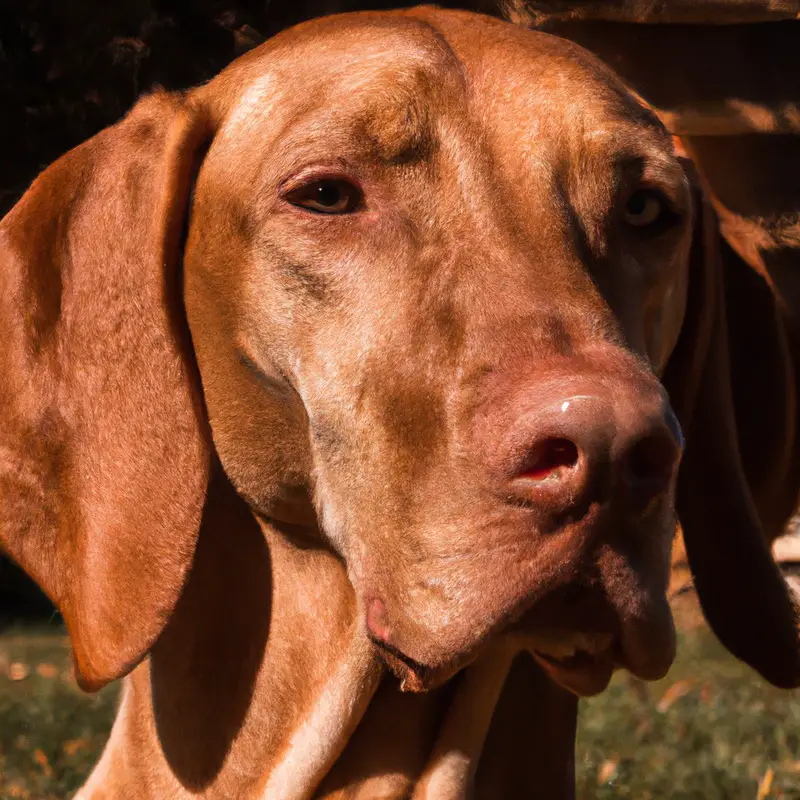What Are Some Potential Vizsla-Safe Alternatives To Harmful Lawn Care Chemicals?
Key Takeaways:
- Organic lawn care solutions offer Vizsla-safe alternatives to harmful chemicals.
- Natural fertilizers and compost can promote a healthy lawn without risking your Vizsla’s health.
- Introducing beneficial insects can naturally control pests in your yard, reducing the need for chemical pesticides.
- Regular aeration and proper watering techniques can help maintain a Vizsla-friendly lawn without relying on harsh chemicals.
Are you a proud Vizsla owner who’s concerned about the potential harm that chemical lawn care products can pose to your furry friend? Well, you’ve come to the right place! As an expert in Vizsla care, I understand the importance of creating a safe and toxin-free environment for our beloved pets.
In this article, I’ll share with you some natural and Vizsla-safe alternatives to harmful lawn care chemicals.
From organic fertilizers to natural weed control methods, we’ll explore all the options to keep your lawn lush and your pup healthy and happy. So let’s dig in and discover the secrets to maintaining a beautiful lawn without compromising your Vizsla’s well-being!
| Vizsla-safe alternatives to harmful lawn care chemicals |
|---|
| 1. Organic fertilizers |
| 2. Natural weed control methods |
| 3. Beneficial insects |
| 4. Mulching |
| 5. Composting |
| 6. Herbicides and pesticides made from natural ingredients |
Vizsla-friendly natural lawn care alternatives
Organic fertilizers as an alternative to chemical fertilizers
Organic fertilizers offer a safe and natural alternative to chemical fertilizers in lawn care. These fertilizers are derived from organic materials, such as compost, manure, or plant residues.
They provide essential nutrients to your lawn without the harmful chemicals found in traditional fertilizers.
Additionally, organic fertilizers help improve soil health and promote long-term sustainability. Popular options include compost tea, bone meal, and seaweed-based fertilizers.
By choosing organic fertilizers, you can maintain a healthy lawn for your Vizsla while minimizing the environmental impact.

Utilizing compost and natural compost tea for lawn maintenance
Utilizing compost and natural compost tea for lawn maintenance is a great way to nourish your lawn and keep it healthy. Compost is rich in nutrients and organic matter, which helps improve soil quality and promote plant growth.
You can spread compost over your lawn as a natural fertilizer or create compost tea by steeping compost in water.
This tea can be sprayed onto your lawn to provide additional nourishment. These natural alternatives are safe for a Vizsla and the environment, making them an excellent choice for lawn care.

Implementing proper mowing techniques to promote healthy grass growth
When it comes to promoting healthy grass growth, implementing proper mowing techniques is key.
Here are some tips to help you achieve a lush lawn:
- Set your mower blade to the correct height for your grass type. Cutting too short can stress the grass and make it more susceptible to disease and weed growth.
- Avoid mowing when the grass is wet. This can lead to uneven cutting and clumping of grass clippings, which can suffocate the grass beneath.
- Regularly sharpen your mower blade to ensure clean cuts. Dull blades can tear the grass, leaving it vulnerable to disease.
- Change up your mowing direction each time you mow. This helps prevent soil compaction and encourages upright growth.
Using natural weed control methods instead of herbicides
When it comes to controlling weeds in your lawn, there are natural alternatives to harmful herbicides.
Instead of using chemicals, you can try these natural weed control methods:
- Manual removal: Pulling weeds by hand is an effective way to get rid of them. Make sure to remove the entire root to prevent regrowth.
- Mulching: Mulch can smother weeds and prevent them from getting sunlight. Use organic mulch like wood chips or straw to suppress weed growth.
- Weeding tools: Invest in weeding tools like hoes or weed pullers. These tools make it easier to remove weeds without bending and straining your back.
- Vinegar spray: Mix vinegar with water and dish soap to create a natural weed killer. Spray this mixture directly on the weeds, avoiding desirable plants.
- Boiling water: Pouring boiling water over weeds can kill them by damaging their cell structure. Be careful not to pour it on your desirable plants.
By implementing these natural methods, you can control weeds without relying on harmful herbicides.
It’s safer for the environment and for your beloved Vizsla.
Additional precautions for Vizsla owners
Importance of limiting Vizsla’s access to treated areas
Limiting your Vizsla’s access to treated areas is essential to their safety and well-being. Harmful chemicals used in lawn care products can be toxic if ingested or absorbed through their paws.
By keeping them away from these areas, you can prevent potential health issues and minimize their exposure to harmful substances.
This can help maintain their overall health and ensure their safety in your yard.
Washing Vizsla’s paws after walks to remove potential chemical residues
After taking your Vizsla for a walk, it’s important to wash their paws to remove any potential chemical residues. Here’s why: Chemicals from lawn care products or pesticides can get on their paws and be ingested when they lick themselves.
To wash their paws, simply use warm water and gentle soap.
Make sure to thoroughly dry their paws afterwards to prevent any irritation. It’s a simple step that can help keep your Vizsla safe and healthy.
So, just remember to wash those paws after walks!

Establishing a designated “pet-friendly” area in the yard
To establish a designated “pet-friendly” area in your yard, there are a few simple steps you can take. First, choose a safe spot away from any harmful plants or chemicals.
Next, make sure the area is secure with a sturdy fence or gate to keep your Vizsla contained.
Provide shade and fresh water for them to stay cool and hydrated. Consider adding some toys or a comfortable bed for them to enjoy.
Finally, regularly clean and maintain the area to ensure a clean and safe environment for your furry friend.
Consulting with a veterinarian for specific concerns or recommendations
If you have specific concerns about your Vizsla’s health or recommendations for alternatives to harmful lawn care chemicals, consulting with a veterinarian is essential.
They have the expertise and knowledge to address your concerns and provide tailored advice for your Vizsla’s unique needs.
Whether it’s about safe lawn care practices or potential health risks, your veterinarian can guide you in making informed decisions to keep your furry friend happy and healthy.
Reach out to them for professional guidance and peace of mind.
Frequently Asked Questions about Vizsla-safe lawn care alternatives
What are the risks of using harmful lawn care chemicals?
Using harmful lawn care chemicals can pose several risks to both the environment and the health of your Vizsla.
These chemicals, such as pesticides and herbicides, can contaminate soil, water, and air, causing harm to beneficial insects, animals, and plants.
Exposure to these chemicals can also lead to health problems in Vizslas, including skin irritations, respiratory issues, and even more serious conditions like cancer.
It is important to explore and implement Vizsla-safe alternatives to ensure the well-being of your pet and the environment.
Can Vizslas be more susceptible to the effects of lawn care chemicals?
Vizslas can indeed be more susceptible to the effects of lawn care chemicals. Their sensitive skin and respiratory systems make them vulnerable to the toxins found in these products.
When exposed to lawn care chemicals, Vizslas may experience allergic reactions, skin irritations, digestive issues, or even more serious health problems.
It’s important to opt for Vizsla-safe alternatives, such as organic fertilizers, natural pest control methods, and proper lawn maintenance to ensure the health and safety of your furry friend.
Are natural lawn care alternatives as effective as chemical ones?
Natural lawn care alternatives can be just as effective as chemical ones.
Many organic options, such as compost, natural fertilizers, and biological pest control, can promote healthy lawn growth and deter pests.
Additionally, techniques like proper watering, mowing, and aeration can contribute to a thriving lawn without the use of harmful chemicals.
While it may require more effort and patience, choosing natural alternatives can be an eco-friendly and safer option for both your Vizsla and the environment.
Are there any specific natural products that should be avoided for Vizslas?
Yes, there are certain natural products that should be avoided for Vizslas. Some examples include:
- Essential oils: Certain essential oils, such as tea tree oil and eucalyptus oil, can be toxic to dogs if ingested or applied in excessive amounts. It’s best to consult with your veterinarian before using any essential oils around your Vizsla.
- Citrus fruits: While small amounts of citrus fruits like oranges or lemons are generally safe for dogs, the high levels of citric acid can cause digestive upset and even toxicity in larger quantities. It’s best to avoid feeding your Vizsla large amounts of citrus fruits.
- Garlic and onions: These common kitchen ingredients can cause damage to a dog’s red blood cells, leading to anemia if ingested in significant amounts. It’s important to keep these foods away from your Vizsla’s reach.
- Grapes and raisins: These fruits can be toxic to dogs, potentially causing kidney failure. It’s essential to avoid feeding your Vizsla grapes, raisins, or any products that contain them.
Always consult with your veterinarian when introducing new natural products or foods to your Vizsla’s routine to ensure their safety and wellbeing.
Final Verdict
When it comes to maintaining a Vizsla-safe lawn, there are several alternatives to harmful lawn care chemicals that can be implemented.
Organic fertilizers, compost, and natural compost tea provide nutrient-rich options for lawn maintenance.
Proper mowing techniques and natural weed control methods promote healthy grass growth without the use of herbicides.
Additionally, taking precautions such as limiting access to treated areas, washing your Vizsla’s paws, and establishing a designated pet-friendly area can help protect your beloved pet.
By adopting these natural alternatives and taking necessary precautions, you can ensure a safe and healthy environment for your Vizsla.








